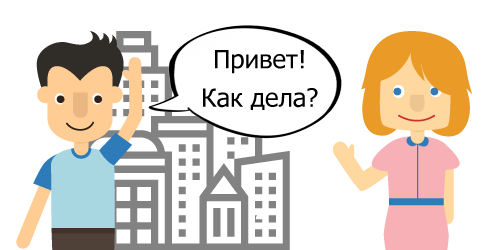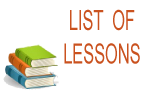Russian course
Basic Russian for beginners
Lesson 5:
Summary of lessons 1 - 4
In this lesson you will learn:
- the most important points from lessons 1 to 4
- different ways to say hello and goodbye
- four new verbs

Useful phrase in Russian
Listen and repeat the sentences you have learnt in the last 4 lessons:
Lesson 1

Lesson 2

Lesson 3

Lesson 4


Russian vocabulary
Read, listen and repeat the basic vocabulary of this lesson:
Verbs
You have learnt two verbs in the present tense, говори́ть (to speak / to say) and знать (to know). They have different endings because they belong to different conjugations. This simply means that they have different endings (you can see below the endings are highlighted).
говори́ть (to say / speak / talk)
Я говорю́
Ты говори́шь
Он / она́ / оно́ говори́т
Мы говори́м
Вы говори́те
Они́ говоря́т
знать (to know)
Я зна́ю
Ты зна́ешь
Он / она́ / оно́ зна́ет
Мы зна́ем
Вы зна́ете
Они́ зна́ют
Russian verbs belong to one of these two conjugation types, unless it is an irregular verb. That is why conjugating a Russian verb is easy. To illustrate this, you will now learn four new verbs: ду́мать, де́лать (they conjugate like знать), ви́деть (it conjugates like говорить) and хоте́ть (it is an irregular verb, so it conjugates irregularly):
ду́мать (to think)
Я ду́маю
Ты ду́маешь
Он / она́ / оно́ ду́мает
Мы ду́маем
Вы ду́маете
Они́ ду́мают
де́лать (to do / to make)
Я де́лаю
Ты де́лаешь
Он / она́ / оно́ де́лает
Мы де́лаем
Вы де́лаете
Они́ де́лают
ви́деть (to see)
Я ви́жу (irregular)
Ты ви́дишь
Он / она́ / оно́ ви́дит
Мы ви́дим
Вы ви́дите
Они́ ви́дят
хоте́ть (to want)
Я хочу́
Ты хо́чешь
Он / она́ / оно́ хо́чет
Мы хоти́м
Вы хоти́те
Они́ хотя́т
Greetings and farewells in Russian
During the last 4 lessons you have learnt to say hello and goodbye in different ways. Here you will find them, plus some new ways you had not seen yet.
English
Russian
Pronunciation
Hello (informal)
Приве́т
pri-vyét
Hello (formal)
Здра́вствуйте
zdrást-vuj-tye
Hello (in Russian "good day")
До́брый день
dó-bryj dyen'
Good morning
До́брое у́тро
dó-bra-ye ú-tro
Good evening
До́брый ве́чер
dó-bryj vyé-chyer
Good night
Споко́йной но́чи
spa-kój-naj nó-chi
See you later
До свида́ния
da svi-dá-niya
See you later
До встре́чи
da vstryé-chi
Bye (informal)
Пока́
pa-ká
Do you want to learn Russian with the best courses and books?
We recommend the best Russian course, with 150 videos and personal tutor.
If you love reading, have a look at these books with stories in easy Russian with audio.
If you want to practice your Russian, here you can find exercise books, with key and grammar tables.

Russian grammar
Summary of the most important grammar points learnt in the last 4 lessons:
Verb "to be" in present tense
In modern Russian, the verb "быть" is not used in the present tense (but it is in the past and future).
The three Russian genders
In Russian, nouns have a gender, which can be either masculine, feminine or neuter.
The articles in Russian
In Russian, articles (a, an, the) do not exist. That is why a word like "кни́га" could mean either "a book" or "the book".
How to say "you" in Russian
In Russian, there are two different ways of saying "you", a formal (вы) and an informal (ты) way.
Making questions in Russian
If you want to form a question in Russian, you only need to use the question mark. This means:
- You do not need to change the position of the verb.
- You do not need to use an auxiliary verb like "do" in English.
This Russian course will always be free. Please, share it
By sharing our website, you're helping us continue with our project: developing free Russian courses for everyone. Please, invest some seconds of your time in sharing us. Thank you.
|
Contact us Site map Terms of use Privacy policy Shop - Russian school Copyright © www.russianforfree.com All rights reserved. |


